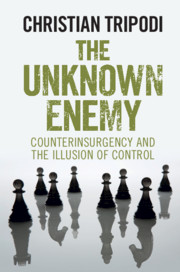Book contents
- The Unknown Enemy
- The Unknown Enemy
- Copyright page
- Dedication
- Contents
- Preface
- Acknowledgements
- 1 Culture Warriors
- 2 Themes and Issues
- 3 Knowledge, Influence and Control
- 4 ‘Peaceful Penetration’ on the North-West Frontier, 1919–39
- 5 ‘Hearts and Minds’ vs French Revolutionary War: Algeria 1954–62
- 6 Pacification in Vietnam 1964–72
- 7 Political Warfare in Iraq: Al Anbar and Basra, 2006–9
- 8 Political Warfare in Afghanistan: Helmand Province, 2006–12
- 9 Conclusion
- Bibliography
- Notes
- Index
4 - ‘Peaceful Penetration’ on the North-West Frontier, 1919–39
Published online by Cambridge University Press: 06 November 2020
- The Unknown Enemy
- The Unknown Enemy
- Copyright page
- Dedication
- Contents
- Preface
- Acknowledgements
- 1 Culture Warriors
- 2 Themes and Issues
- 3 Knowledge, Influence and Control
- 4 ‘Peaceful Penetration’ on the North-West Frontier, 1919–39
- 5 ‘Hearts and Minds’ vs French Revolutionary War: Algeria 1954–62
- 6 Pacification in Vietnam 1964–72
- 7 Political Warfare in Iraq: Al Anbar and Basra, 2006–9
- 8 Political Warfare in Afghanistan: Helmand Province, 2006–12
- 9 Conclusion
- Bibliography
- Notes
- Index
Summary
Despite the advances made by social science as an aid to colonial control during the early twentieth century, one of the most revealing case studies of imperial ‘understanding’ in action during this period comes not from Africa, where trained ‘anthropologists’ had become part of the British colonial government’s administrative repertoire. Instead it came from the isolated and violent enclave of the North-West Frontier, where ‘classical’ forms of knowledge-gathering continued to dominate up to and post-World War II. Here was a hotbed of government activism, where officials sought to actively manipulate and shape local social and political structures in the pursuit of peace and stability.1 Ostensibly focused upon keeping tribal resistance to imperial rule at palatable levels through cost-effective administration, in reality these actions hid determined attempts by officials of the Indian Political Service – the so-called politicals – to effect transformative change upon aspects of native Pashtun society.
- Type
- Chapter
- Information
- The Unknown EnemyCounterinsurgency and the Illusion of Control, pp. 67 - 88Publisher: Cambridge University PressPrint publication year: 2020



